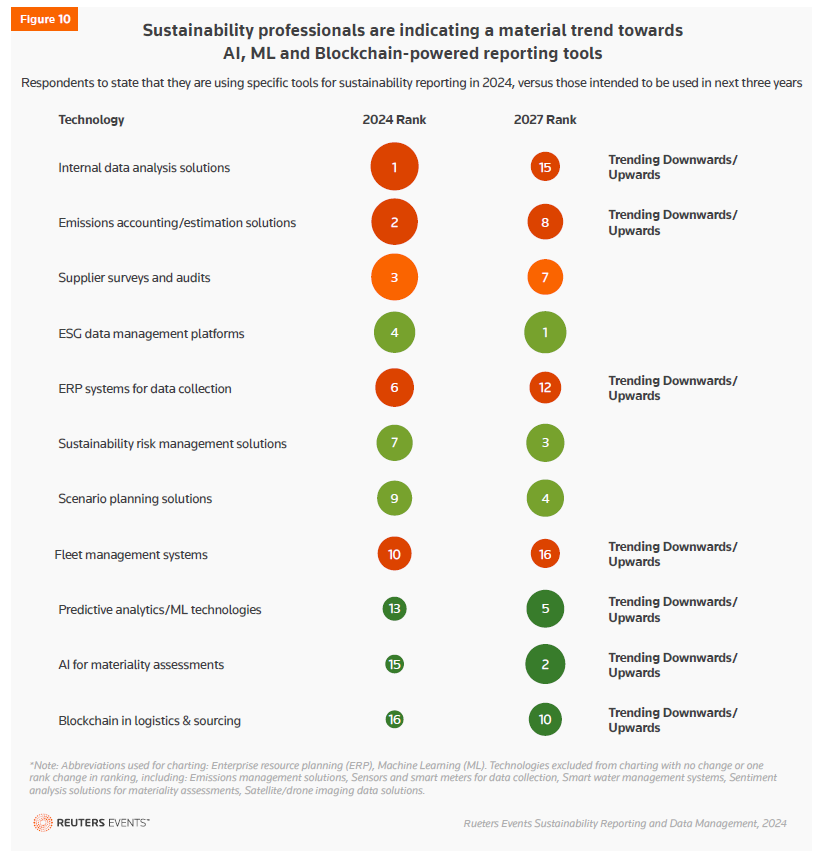Sustainability reporting professionals are shifting from traditional tools to a suite of advanced solutions, as revealed in Reuters Events' new report, with ESG data management platforms, AI, and blockchain emerging as priorities for future investment
As sustainability reporting and data collection becomes more important, the challenges that surround these tasks become more pronounced. This, in turn, is placing additional pressures on investments and procurement, with practitioners seeking the perfect tool to ease their reporting concerns.
To better examine this situation, Reuters Events has published a new report, Sustainability Reporting & Data Collection Strategies Outlook 2024, in which we surveyed more than 3,000 corporate sustainability professionals. Most interestingly, respondents underscored the fact that there is no one-size-fits-all platform in existence today. Instead, practitioners are seeking a suite of tools and services — ranging from internal data analysis tools to more advanced solutions like predictive analytics — that can help them meet sustainability reporting demands.
Most useful tools today seen as waning in future
Today’s most popular tools and technologies include internal data analysis solutions, emissions accounting/estimation solutions, and supplier surveys and audits — which were ranked first, second, and third, respectively, in our investment rankings this year. These are followed closely by management platforms for environmental, social & governance (ESG) data. Combined, these four tools could be considered critical elements to any sustainability reporting function, given the tools’ capability to source, collate, store, and interpret the data required.
What is interesting is that internal data analysis solutions in particular falls from the most popular technology among respondents in our survey, to the 15th most popular tool — or to put it differently, the second-least popular tool — when we asked respondents to predict their investment for 2027. Meanwhile, emissions accounting solutions fell from the second-most popular to eighth-most popular choice.
One technology among our top four that bucked this trend is ESG data management platforms, which rose to become our most-popular technology by investment mentions for 2027. This is also further supported by trends identified in the rise of third-party platforms for data storage, suggesting that such platforms will continue to rise in importance among sustainability practitioners in the coming years.

Technology tools of tomorrow seen as rising in priority
AI and blockchain to see increase in investment — The technology to see the biggest increase in investment sentiment is artificial intelligence (AI) for use in materiality assessments, which becomes our second-most popular technology for investment in the next three years. It is unsurprising to see an anticipated fast rise of AI in the use of materiality assessments because of the necessity of such assessments for compliance with legislation and reporting directives such as the European Union’s Corporate Sustainability Reporting Directive (CSRD), with the technology promising to automate laborious and resource-intensive practices. Likewise, given the necessity for accurate supply chain data for Scope 3 emissions reporting, there is a clear use case for blockchain technologies to verify what can be difficult-to-source data.
GenAI expected to have a significant impact — While not included in our suite of technologies, we asked respondents separately what kind of an impact generative AI (GenAI) may have on their sustainability reporting capabilities. Last year saw a surge in interest in GenAI for a multitude of business cases, and sustainability reporting is no different. In our survey, more than two-thirds (67%) of respondents said they expect GenAI to have a material impact on their sustainability reporting.
Most effective and easy to implement tools
We also set out to better understand the overall experience of today’s technologies, exploring how sustainability practitioners regarded tools in terms of their effectiveness and ease of implementation. Across both metrics, sensors and smart meters for data collection scored highest. And while their overall use case may be limited to collecting very specific data, they do so efficiently and are comparatively easy to implement.
ESG data management platforms scored highly for efficacy, but comparatively poorly for ease of implementation. Respondents said the technology suite helped in ensuring the completeness of data required and provide better data management controls. “[They] allow us to collect, manage, and analyze ESG data internally and externally to create goals, and track our progress towards those goals,” one survey respondent said. However, the complexity in the supply chain where what was described as a “myriad of ESG issues” can arise meant systems can require simplification.
Emissions accounting solutions, while considered a relatively critical technology given its position near the top of our investment rankings, scored distinctly close to our average for both efficacy and ease of implementation. Respondents highlighted that while there was high confidence in their calculations given automation and a reduced chance of human error, a lack of primary data means some reports may not be as accurate as needed.
Understanding the barriers to investment
Survey respondents also cited internal, external, and technological factors as barriers to investment. Internal factors were most commonly mentioned, cited by 56% of respondents, while technological and external factors were cited by 41% and 18% of respondents respectively. (Respondents were allowed to cite a number of different barriers to investment.)
Across all barriers, the most commonly cited barrier was the limited access to capital or budgetary constraints, cited by 16% of respondents. When combined with the 15% of respondents who cited high costs of implementation (which we have included within the technological bracket), cost-related issues become a clear barrier to investment for many sustainability practitioners today.
While this is not surprising, it is clear that sustainability professionals need to be judicious in prioritizing their suite of tech tools and become more sophisticated in outlining their expected return on investment. Guidance for procuring these tools for effective collaboration cross-functionally with the company’s IT function and other partners is essential. Likewise, inserting sustainability into core financial workflows, such as those for capital requests, could assist practitioners in overcoming barriers to gaining buy-in from the organization’s CFO or other individuals who control the budgets.
You can download a copy of the Reuters Events research report, Sustainability Reporting & Data Collection Strategies Outlook 2024, here.







